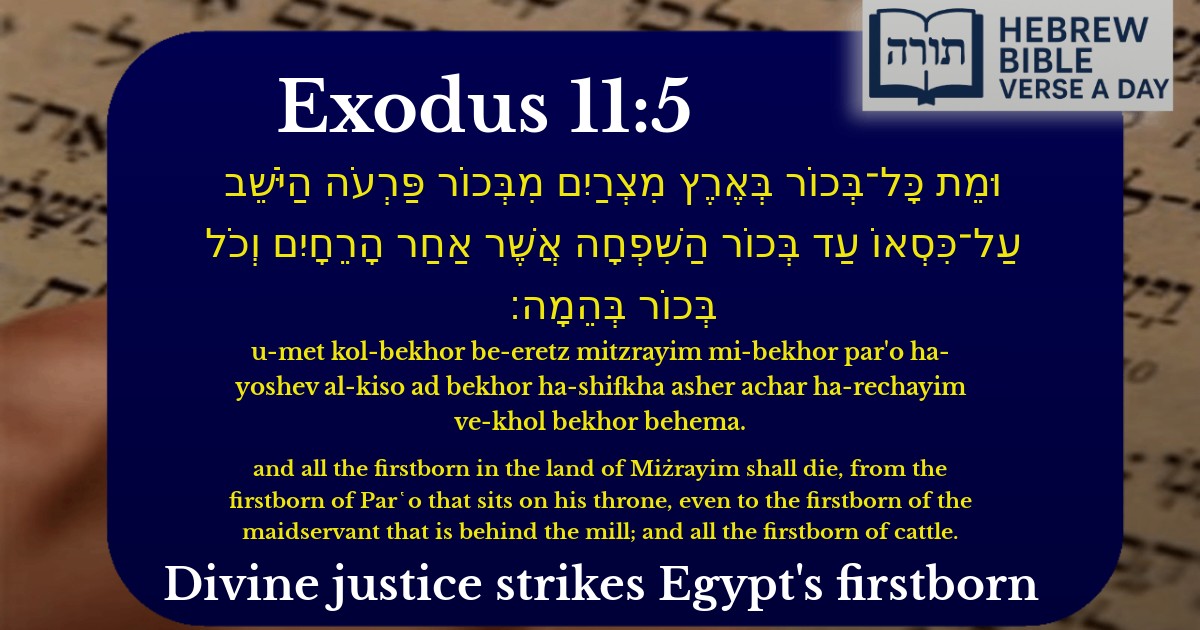Join Our Newsletter To Be Informed When New Videos Are Posted
Join the thousands of fellow Studends who rely on our videos to learn how to read the bible in Hebrew for free!
Hebrew Text
וּמֵת כָּל־בְּכוֹר בְּאֶרֶץ מִצְרַיִם מִבְּכוֹר פַּרְעֹה הַיֹּשֵׁב עַל־כִּסְאוֹ עַד בְּכוֹר הַשִּׁפְחָה אֲשֶׁר אַחַר הָרֵחָיִם וְכֹל בְּכוֹר בְּהֵמָה׃
English Translation
and all the firstborn in the land of Miżrayim shall die, from the firstborn of Par῾o that sits on his throne, even to the firstborn of the maidservant that is behind the mill; and all the firstborn of cattle.
Transliteration
U-met kol-bekhor be-eretz mitzrayim mi-bekhor par'o ha-yoshev al-kiso ad bekhor ha-shifkha asher achar ha-rechayim ve-khol bekhor behema.
Hebrew Leining Text
וּמֵ֣ת כׇּל־בְּכוֹר֮ בְּאֶ֣רֶץ מִצְרַ֒יִם֒ מִבְּכ֤וֹר פַּרְעֹה֙ הַיֹּשֵׁ֣ב עַל־כִּסְא֔וֹ עַ֚ד בְּכ֣וֹר הַשִּׁפְחָ֔ה אֲשֶׁ֖ר אַחַ֣ר הָרֵחָ֑יִם וְכֹ֖ל בְּכ֥וֹר בְּהֵמָֽה׃
וּמֵ֣ת כׇּל־בְּכוֹר֮ בְּאֶ֣רֶץ מִצְרַ֒יִם֒ מִבְּכ֤וֹר פַּרְעֹה֙ הַיֹּשֵׁ֣ב עַל־כִּסְא֔וֹ עַ֚ד בְּכ֣וֹר הַשִּׁפְחָ֔ה אֲשֶׁ֖ר אַחַ֣ר הָרֵחָ֑יִם וְכֹ֖ל בְּכ֥וֹר בְּהֵמָֽה׃
🎵 Listen to leining
Parasha Commentary
📚 Talmud Citations
This verse is quoted in the Talmud.
📖 Pesachim 54a
The verse is referenced in a discussion about the timing of the plague of the firstborn in Egypt.
📖 Sotah 11b
The verse is cited in a discussion about the suffering of the Egyptians during the Exodus.
📖 Megillah 10b
The verse is mentioned in a discussion about the downfall of Pharaoh and the Egyptians.


The Scope of the Plague of the Firstborn
The verse (Shemot 11:5) describes the devastating final plague that would strike Mitzrayim, affecting all firstborn—from Pharaoh's heir to the lowest maidservant's child, and even the firstborn of animals. This comprehensive judgment demonstrates Hashem's absolute sovereignty and the precision of divine justice.
Rashi's Explanation: From the Highest to the Lowest
Rashi emphasizes the phrase "from the firstborn of Pharaoh... to the firstborn of the maidservant", noting that the plague would affect all strata of Egyptian society without exception. Even the firstborn of prisoners (symbolized by "the maidservant behind the mill") would perish, showing that no one could escape divine retribution.
Rambam on Divine Justice
Rambam (Hilchot Teshuvah 6:5) teaches that Hashem's punishments are measured precisely. The Egyptians enslaved Bnei Yisrael and drowned their infants (Shemot 1:22), so their firstborns were stricken in kind—middah k'neged middah (measure for measure).
Midrashic Insights
The Significance of "Behind the Mill"
The phrase "the maidservant behind the mill" (רֵחַיִם) refers to the lowest class—those grinding grain in servitude. The Talmud (Sanhedrin 92b) connects this to the idea that even those who seemed insignificant in Egyptian society were held accountable for their participation in or complacency toward Jewish oppression.
Firstborn Animals: A Judgment on Egyptian Idolatry
The inclusion of firstborn cattle highlights that the plague also targeted Egyptian religious corruption. Ramban explains that since animals like the Apis bull were central to Egyptian worship, their death dismantled the illusion of their deities' power.